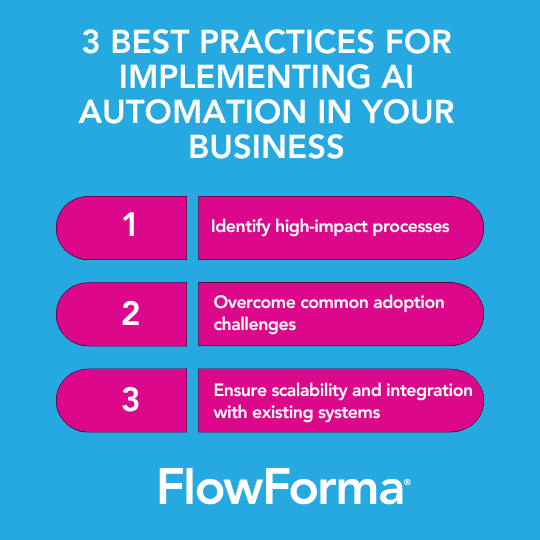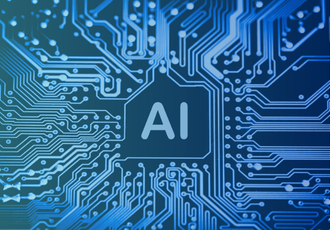FlowForma: The only no-code process automation platform with AI Copilot and Ambient Process Discovery, empowering regulated industries to automate complex workflows in minutes.
Why I wrote this: As CTO at FlowForma, I've seen how regulated industries struggle to bridge the gap between innovation and compliance. This article distills the real-world lessons I've learned working with leaders across financial services, healthcare, and manufacturing.
Key Takeways
|
Organizations in regulated industries are rapidly embracing AI automation to streamline compliance, reduce manual overhead, and accelerate innovation. Today, more and more businesses are turning to AI automation or IA (intelligent automation) – with 20% of organizations investing $1-5 million in adopting a suite of automation technologies.
From healthcare to manufacturing and finance, AI-driven automation is now transforming how regulated industries operate and compete. Below, discover seven real-world examples tailored for leaders driving digital transformation.
The Benefits of AI Automation
AI automation delivers transformative benefits that drive operational excellence and competitive advantage:
- Increased Efficiency: Automate repetitive tasks and workflows, freeing up human resources for strategic initiatives
- Cost Reduction: Reduce operational costs by up to 60% through process optimization and error elimination
- Error Minimization: Eliminate human errors in data processing and decision-making workflows
- Enhanced Compliance: Ensure consistent adherence to regulatory requirements with automated audit trails
- Improved Decision-Making: Leverage predictive analytics and real-time insights for better business outcomes
- Scalability: Easily scale operations without proportional increases in workforce or infrastructure
What is AI Automation?
AI automation merges artificial intelligence with automation to streamline repetitive tasks, such as approval processes and tasks that require human sign-off, while minimizing human involvement. Essentially, AI systems handle even the most intricate workflows by leveraging machine learning (ML), natural language processing (NLP), and predictive analytics, with humans still needed to approve certain tasks.
How AI Automation Differs from Traditional Automation
|
Criteria |
Traditional Automation |
AI Automation |
|
Technology |
Rule-based, scripted workflows |
Machine learning, NLP, predictive analytics |
|
Flexibility |
Fixed rules, requires manual updates |
Adaptive, learns from data patterns |
|
Decision-Making |
Pre-programmed responses |
Intelligent decision-making based on context |
|
Use Cases |
Simple, repetitive tasks |
Complex workflows, unstructured data |
In a recent webinar I hosted, I spoke about how AI automation is gaining traction across organizations. Listen to my AI automation predictions for the year ahead right here:
The benefits for businesses are huge: AI automated systems cut inefficiencies, reduce errors, and boost decision-making. Additionally, they predict issues, personalize customer experiences, and offer smart recommendations.
| Related read: Learn more about AI automation and key trends |
AI Automation Examples Across Industries and Functions
Here are seven of the latest AI automation examples that are taking these industries by storm:
|
Industry |
AI Automation Use Case |
Key Benefit |
Energy |
AI-powered automation replaces code-heavy legacy workflows with auto-assigning records, unifying process changes and approvals in one place. |
|
Financial Services |
AI-driven fraud detection continuously monitors transactions and flags suspicious activities. |
|
Healthcare |
AI automates administrative processes, patient details, and operation notes while unifying siloed communication across departments. |
|
Construction |
AI and ML automate resource allocation, workflows and timeline predictions. It also analyzes real-time site footage for risk identification. |
|
Manufacturing |
AI-driven smart manufacturing automates compliance management, purchase orders, and inventory tracking. |
|
Education |
AI-powered adaptive learning customizes coursework to match student progress and learning styles. |
|
Pharma & Life Sciences |
AI-automated systems tackle artwork errors with seamless artwork mock-up and production management. |
|
Following are seven of the best examples of AI automation across top industries:
#1. Replacing code-heavy workflows in the energy sector
Code-heavy legacy workflows make it difficult to meet growing regulatory demands for audits and accountability. These require IT expertise for updates, decelerating compliance processes, and increasing error risks.
No-code automation platforms like FlowForma replace these outdated systems for faster updates and compliance. For example, Dresser Natural Gas Solutions leveraged FlowForma’s AI-powered process automation platform to replace code-heavy legacy logbooks with automated approval and record systems, saving time and unlocking widespread adoption.
Customer Success Story: "FlowForma's AI automation reduced our compliance reporting time by 75% and eliminated manual errors in our regulatory submissions." - Imelda Bettinger, SharePoint Developer, Dresser Natural Gas Solutions
#2. Financial services innovation
In this video case study, you'll see how this financial services firm met its challenges head-on with AI-powered process automation:
More use cases here:
For fraud detection
AI analyzes transaction patterns in real-time, with machine learning algorithms identifying unusual behaviors like unexpected large transactions or purchases from unfamiliar locations, enabling financial institutions to respond rapidly to potential fraud and protect customers.
For automated loan processing
AI evaluates applications by analyzing credit scores, income levels, and spending habits to assess risk efficiently, accelerating approvals while maintaining decision accuracy.
For automating compliance processes
For financial institutions, managing compliance and sensitive data is a top priority. Yet 58% of finance leaders still rely on tools like Excel, wary of cybersecurity and compliance risks with automation. Sticking to outdated methods only increases the risk of errors and inefficiencies. FlowForma's compliance module changes this narrative by offering a secure, automated solution that meets stringent regulatory standards. With features like e-signatures, real-time audit trails, and automated workflows, FlowForma ensures your data stays secure and compliant, giving you peace of mind while improving efficiency.
See how FlowForma Copilot builds an insurance renewal process in minutes in this interactive demo.
#3. Digitizing healthcare
In an industry where time is a critical resource, AI automation further ensures that doctors and clinicians save time and focus on patient care by automating tedious admin processes. For instance, FlowForma’s AI Copilot allows building several healthcare workflows in minutes, driving improvements by digitizing patient details and operation notes in one seamless process.
See FlowForma Copilot build a patient onboarding process in minutes in this interactive demo.
#4. Optimizing project scheduling and safety monitoring in construction
The construction industry struggles with challenges like access issues, health and safety compliance, and poor communication due to a lack of unified systems. Managing a multiskilled workforce involves heavy paperwork, while much of the industry's knowledge remains siloed and not digitized.
The construction industry struggles with challenges like access issues, health and safety compliance, and poor communication due to a lack of unified systems. Managing a multiskilled workforce involves heavy paperwork, while much of the industry’s knowledge remains siloed and not digitized.
AI and machine learning help by automating resource allocation, workflows, and timeline predictions while analyzing real-time site footage to identify safety risks. For example, Downer improved construction site management and safety by integrating FlowForma to automate workflows such as purchase orders and site inductions, reducing errors and enhancing efficiency.
In this video, Downer describes their journey to improving safety with FlowForma Process Automation.
#5. AI automation for smart manufacturing processes
The manufacturing sector faces several challenges, including labor shortages, supply chain disruptions, rising costs, and the need for better compliance management. Many manufacturers also struggle with inefficient processes, lack of visibility across operations, and the inability to fully automate key workflows.
The manufacturing sector faces several challenges, including labor shortages, supply chain disruptions, rising costs, and the need for better compliance management. Many manufacturers also struggle with inefficient processes, lack of visibility across operations, and the inability to fully automate key workflows.
Tools like FlowForma address these issues by enabling manufacturers to automate critical processes such as compliance management, purchase orders, and inventory tracking. Besides, FlowForma’s no-code process automation empowers staff to manage workflows independently, alleviating labor shortages while boosting productivity and ensuring seamless operational continuity.
#6. Personalized learning and automated grading systems for new-gen educators
According to Forbes Advisor, 55% of educators believe AI has a positive effect on the learning and teaching process with improved educational outcomes. AI-driven capabilities power automated grading systems that evaluate assignments, provide immediate feedback and identify learning gaps.
Working alongside these systems, AI systems inherently analyze large datasets and generate insights to understand learners at a granular level. Additionally, AI automation streamlines tasks like reporting and expense claims, boosting efficiency and allowing educators to focus on student outcomes.
Read how FlowForma helped Abingdon & Witney College introduce business efficiencies to an educational environment.
#7. Accelerating new developments and research in pharma & life sciences
AI is changing the game in drug discovery, but beyond that, it is also improving operational processes in the pharmaceutical industry. For instance, a global pharmaceutical company tackled artwork errors, one of the leading causes of product recalls, with FlowForma’s automated workflows.
With smooth artwork mock-up and production management, the company improved artwork efficiency by 60%, unlocking visibility on priority projects.
Challenges and Risks of AI Automation
While AI automation offers significant benefits, organizations must address several challenges:
-
Data Quality Issues: Poor data quality can lead to inaccurate AI decisions. Mitigation: Implement robust data governance and validation processes.
-
Change Management: Employee resistance to automation adoption. Mitigation: Provide comprehensive training and communicate benefits clearly.
-
Integration Complexity: Difficulty connecting AI systems with existing infrastructure. Mitigation: Choose platforms with pre-built integrations and APIs.
-
Security Concerns: Potential vulnerabilities in AI systems. Mitigation: Implement robust cybersecurity measures and regular audits.
-
Workforce Impact: Concerns about job displacement. Mitigation: Focus on augmenting human capabilities rather than replacing workers.
3 Best Practices for Implementing AI Automation in Your Business

Best practices for implementing AI automation
Implementing AI automation can significantly enhance business operations, but it's essential to approach its integration thoughtfully. Here are three best practices to ensure successful AI adoption:
- Identify high-impact processes
Begin by pinpointing repetitive, time-consuming, and data-intensive processes. These areas are prime candidates for AI automation, offering substantial efficiency gains. Additionally, prioritize simple processes that deliver quick wins and demonstrate immediate ROI.
- Overcome common adoption challenges
AI adoption often encounters hurdles such as data quality issues, resistance to change, and integration complexities. Address these by investing in employee training to build AI literacy, ensuring data accuracy, and selecting AI tools that align with existing systems.
- Ensure scalability and integration with existing systems
When deploying an AI automation tool, it’s essential to choose one that is scalable to accommodate future growth. Integration with existing systems like enterprise resource planning (ERP), customer relationship management (CRM) is equally crucial for smooth operation.
How AI Automation Drives Operational Excellence
Tools like FlowForma provide a no-code, all-in-one digital solution for organizations to automate processes. Key features include:
AI Agent
The FlowForma AI Agent Rule is a significant advancement in FlowForma's AI capabilities. It functions as a personal assistant within a process flow, allowing users to automate tasks such as extracting data from documents, validating information, and performing specific actions.
The AI Agent can be configured with conditions, events, and instructions in plain English, which it follows to carry out tasks. For example, it can extract details like invoice amounts or supplier names, perform sentiment analysis, or evaluate the content of a CV for specific queries.
The AI feature, called "AI Assistance," activates multiple tools like the AI Agent, Summarize Agent, and Copilot. This tool integrates seamlessly into processes and helps automate repetitive tasks, adding significant value to the product by enabling users to create custom AI-driven workflows.
In this recent webinar I hosted, I introduce FlowForma's latest agents for claims, tender management and vendor risk management.
No-code automation
FlowForma's no-code platform empowers teams to quickly implement automation by allowing users to create, manage, and optimize workflows without requiring coding knowledge.
AI Copilot
FlowForma’s AI Copilot is a powerful tool that helps businesses scale their automation efforts. By leveraging generative AI, AI Copilot enables users to rapidly design, map, and automate workflows without needing technical expertise.
This AI-powered assistant also streamlines process creation by interpreting user input in natural language and converting it into actionable workflows.
Discover more about Copilot in this video:
Automated document generation

Automate document generation for better collaboration with FlowForma
AI-driven automation helps break down silos by enabling smarter, more efficient communication across departments. With features like automated document generation, companies can create standardized documents like contracts, reports, and proposals with minimal manual input. This reduces delays in document creation, enhances collaboration between departments, and ensures that all teams are working with the most up-to-date information.
Workflow builder
FlowForma’s workflow builder offers a simple, intuitive interface for creating everything from basic to complex workflows without any coding required. Users can quickly set up workflows, automate task assignments, and ensure smooth task progression, all while maintaining control over governance and collaboration.
AI-powered form automation
A misplaced decimal, an incomplete field, or inconsistent formatting can snowball into approval delays, compliance issues, or even financial loss. FlowForma’s AI-powered form automation prevents this by intelligently capturing, validating, and populating data in real time.
It automatically recognizes patterns, suggests relevant inputs, and flags inconsistencies before submission – without any human intervention. This minimizes errors, reduces rework, and ensures your data is accurate throughout.
Ambient Process Discovery
FlowForma's new Ambient Process Discovery Agent, is the fastest way to capture processes from voice, meetings, and everyday work, without disrupting your flow.
Key Benefits Include:
1: Meeting to workflow in minutes, turn conversations into ready-to-review processes
2: Capture every detail, no missed steps, no forgotten ideas
3: Save time for IT & business, skip lengthy workshops and manual documentation
Real-time data and visualization
FlowForma Insights turns your data into actionable intelligence, simplifying process generation, reporting, and analysis. This facilitates informed and real-time decision-making, allowing companies to unlock a clear view of critical operations. Users can also create dynamic dashboards in minutes through an intuitive interface, without any coding and configuration hassle.
It is time to say goodbye to manual tasks and unlock operational excellence with secure, AI-powered automation. Start your journey today—sign up for a 7-day free trial with FlowForma!
Frequently Asked Questions about AI Automation
What is an example of AI automation?
A common example is automated invoice processing where AI extracts data from invoices, validates information against purchase orders, routes for approval, and updates accounting systems—all without human intervention. This reduces processing time from hours to minutes while eliminating manual errors.
What are the types of AI systems?
AI systems are typically categorized into four types: Reactive machines (respond to specific inputs), Limited memory (learn from historical data), Theory of mind (understand emotions and intentions), and Self-aware AI (possess consciousness). Most current business AI automation uses reactive machines and limited memory systems.
How to use AI automation to make money?
AI automation generates revenue by reducing operational costs, improving efficiency, enhancing customer experiences, and enabling new business models. Companies typically see ROI through reduced labor costs, faster processing times, improved accuracy, and the ability to scale operations without proportional cost increases.
Is AI automation expensive or difficult to implement?
Modern no-code AI automation platforms like FlowForma have significantly reduced both cost and complexity. Implementation can start with simple processes and scale gradually, with many organizations seeing positive ROI within 3-6 months. The key is choosing the right platform and starting with high-impact, low-complexity processes.
Does AI automation replace human workers?
AI automation typically augments rather than replaces human workers. It handles repetitive, rule-based tasks, freeing employees to focus on strategic, creative, and relationship-building activities. Most successful implementations involve reskilling workers for higher-value roles rather than workforce reduction.
It is time to say goodbye to manual tasks and unlock operational excellence with secure, AI-powered automation. Start your journey today schedule a demo of FlowForma to explore the potential of AI-automation for your organization.


 By
By 




